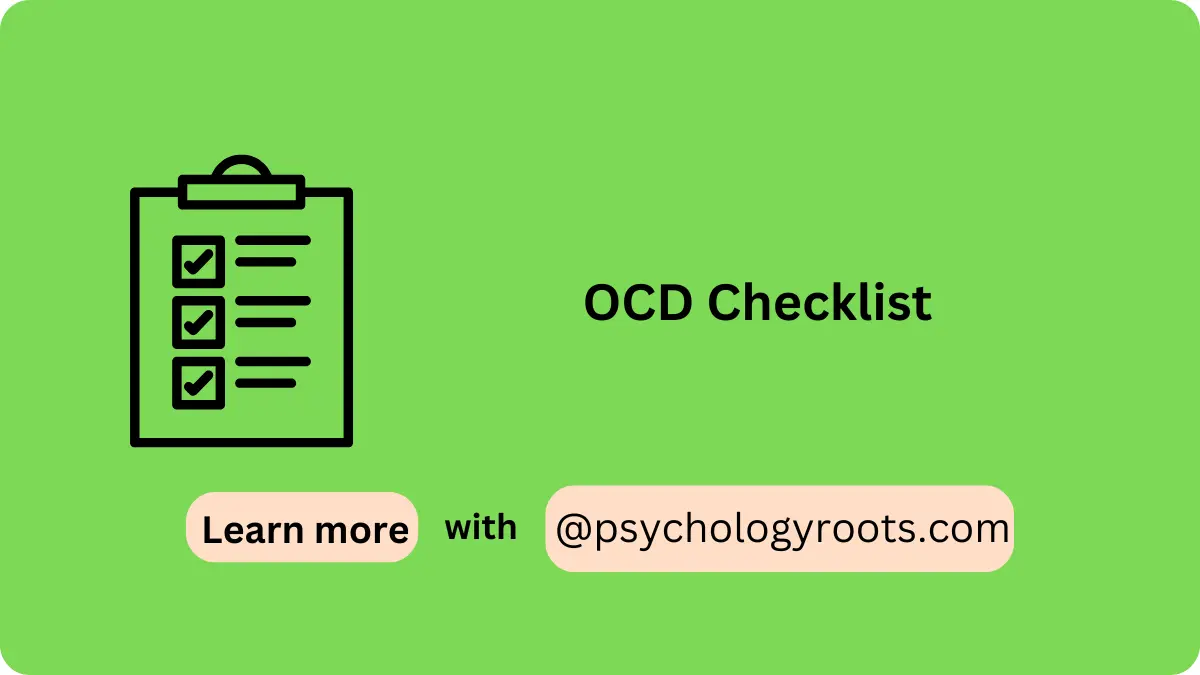Table of Contents
OCD Checklist
Here in this post, we are sharing the “OCD Checklist”. You can read psychometric and Author information. We have thousands of Scales and questionnaires in our collection (See Scales and Questionnaires). You can demand us any scale and questionnaires related to psychology through our community, and we will provide you with a short time. Keep visiting Psychology Roots.
About OCD Checklist
Scale Name
OCD Checklist
Author Details
Adapted from Edna Foa & Reid Wilson
Translation Availability
English

Background/Description
The OCD Checklist, adapted from the questionnaire in Stop Obsessing! by Edna Foa and Reid Wilson, is a self-report tool designed to help individuals identify symptoms of Obsessive-Compulsive Disorder (OCD). Originally developed to accompany the popular guide to overcoming OCD, this checklist helps users recognize and understand common symptoms, including intrusive thoughts, repetitive behaviors, and compulsive rituals.
Designed with accessibility in mind, it provides a structured approach to identifying OCD characteristics, making it valuable for self-assessment, clinical settings, and educational contexts. By providing users with specific symptom prompts, the checklist enables individuals to better understand their behaviors and serves as an initial step in seeking further evaluation or treatment if necessary.
Administration, Scoring and Interpretation
- Obtain the Copy: Available in Stop Obsessing! by Edna Foa and Reid Wilson, or through reputable psychological resources.
- Purpose: To identify potential OCD symptoms, aiding individuals in recognizing behaviors and thought patterns consistent with OCD.
- Instructions: Respondents mark items that reflect their current experiences with thoughts and behaviors typically associated with OCD.
- Time: Approximately 10–15 minutes to complete.
- Administer the Scale: Primarily a self-assessment tool, but it can also be administered by a clinician in therapeutic or educational settings.
Reliability and Validity
While the OCD Checklist is designed for practical use rather than formal diagnosis, it has been adapted from a reputable source in OCD treatment literature. The checklist aligns with the symptoms outlined in the DSM criteria for OCD, enhancing its face validity as a self-assessment tool. Though not a diagnostic instrument, its development by renowned OCD experts Edna Foa and Reid Wilson ensures it reflects clinically recognized symptoms, making it useful as a preliminary tool for understanding OCD tendencies.
Available Versions
Multiple-Items
Reference
Foa, E., & Wilson, R. (1991). Stop Obsessing! Bantam Books.
Important Link
Scale File:
Frequently Asked Questions
Can this checklist diagnose OCD?
No, it is not a diagnostic tool but can help individuals recognize potential OCD symptoms.
Is it suitable for all age groups?
Primarily designed for adults, but it can be adapted for use with adolescents under guidance.
How can I access the checklist?
It can be found in Stop Obsessing! by Edna Foa and Reid Wilson or through licensed mental health resources.
Is professional follow-up required?
Yes, a comprehensive assessment by a qualified mental health professional is recommended if OCD symptoms are identified.
Disclaimer
Please note that Psychology Roots does not have the right to grant permission for the use of any psychological scales or assessments listed on its website. To use any scale or assessment, you must obtain permission directly from the author or translator of the tool. Psychology Roots provides information about various tools and their administration procedures, but it is your responsibility to obtain proper permissions before using any scale or assessment. If you need further information about an author’s contact details, please submit a query to the Psychology Roots team.
Help Us Improve This Article
Have you discovered an inaccuracy? We put out great effort to give accurate and scientifically trustworthy information to our readers. Please notify us if you discover any typographical or grammatical errors.
Make a comment. We acknowledge and appreciate your efforts.
Share With Us
If you have any scale or any material related to psychology kindly share it with us at psychologyroots@gmail.com. We help others on behalf of you.